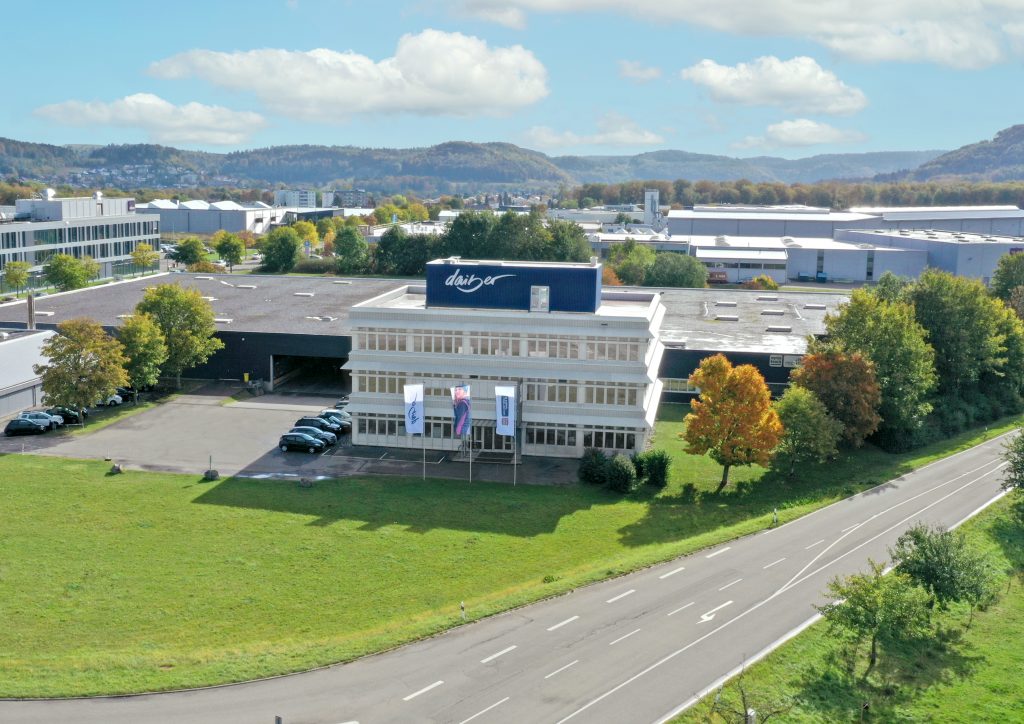Renewable energy, supply chain visibility and fair working conditions, the textile company Gustav Daiber GmbH shows awareness to their economic, ecological and social responsibility by signing the WIN-Charta, a sustainability management system by the government of the German federal state Baden-Württemberg.
The WIN-Charta proposes 12 guiding principles for sustainable businesses and invokes companies to constantly increase their sustainability efforts. A big step has already been taken: Since August Daiber’s headquarters in Albstadt are provided with 100 percent of green electricity.

To emphasise the significance of sustainability for Daiber, Kai Gminder, Managing Director, signed the WIN-Charta report representing the textile company that owns the two fashion brands James & Nicholson and myrtle beach. With implementing Baden-Württemberg’s sustainability management system, Daiber commits to sustainable business activities.
Gminder says: “Energy and emissions, product responsibility and creating new incentives for rethinking our business are the key points of our sustainability work.”
In addition to the planned initiatives, the target concept based on the WIN-Charta also shows the sustainability performance to date. Since 2012, Gustav Daiber GmbH is a member of the amfori Business Social Compliance Initiative (BSCI) and therefore advocates to social benefits, such as fair working conditions, along the international supply chain. By the means of the upcoming introduction of the amfori Business Environmental Performance Initiative (BEPI) system, another main topic will be environmental protection.
Current sustainability activities at Daiber
The focus on ecologically valuable actions is already visible in the current activities regarding sustainability: Daiber cooperates with the non-profit foundation myclimate since 2018 and has been developing activities through annual analyses to reduce CO2 emissions. For example, sustainable and recycled materials such as organic cotton are increasingly used for the production of textiles. Products of certain product lines are packed in recycled polybags. Furthermore, Daiber produces their annually distributed main catalogues climate-neutral with another sustainability partner, ClimatePartner. An internal recycling system, including a cardboard press, also contributes to the responsible value chain.
Green electricity, subsidised bikes, electric mobility
By completing the switch to green electricity in August 2022 at the headquarters in Albstadt, about 300 tons of CO2 emissions are avoided every year. “Albstrom aqua” is generated from hydroelectric power and is provided by the public utility of the city Albstadt. Charging stations offering green energy are available for Daiber’s hybrid vehicle fleet.
Besides, the employees are actively made aware of sustainability topics and can participate in climate protection through campaigns such as a subsidised bike provided by Daiber. As part of the “Stadtradeln” project, a team of Daiber employees cycled to avoid emissions and came seventh in the Zollernalbkreis district, which is located in the German federal state Baden-Württemberg. With 334 kilometers per person as average, they came third in the local winner’s podium. “Stadtradeln” is a nationwide competition in Germany in which participants cycle as many kilometers as possible within 21 days and thereby contribute to environmental protection.
Fair working conditions and long-term partnerships
Along with environmental protection, social sustainability is a top priority for Daiber: as part of the JCK Holding GmbH Textil KG group, the company has been following the JCK Code of Conduct for cooperation with suppliers since 1999. In the course of this and the membership in the amfori BSCI, binding requirements on social aspects and fair working conditions are fulfilled worldwide. “Long-term partnerships and a close relationship with suppliers are a matter of importance for Daiber,” emphasises Gminder.
With the planned introduction of the amfori BEPI system, the activities that Daiber already implement for the environment are to be recorded and reviewed. After a critical review, new concepts for more product responsibility and a more responsible value chain will be developed and introduced. As an example, this is currently being done together with Daiber’s largest suppliers for the product groups T-shirts, polo shirts and sweatshirts. In order to permanently establish the sustainability process initiated with the WIN-Charta declaration, the implementation status is transparently documented and the sustainability commitment is renewed annually.










